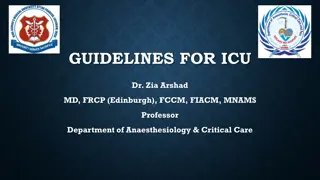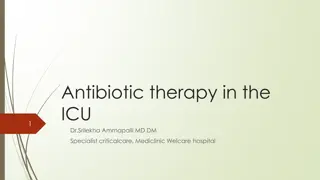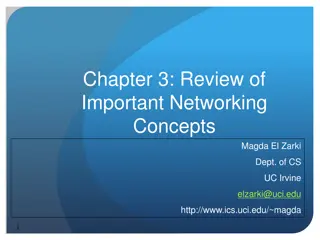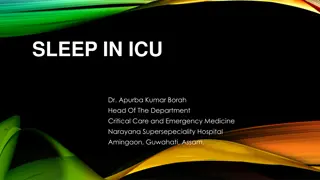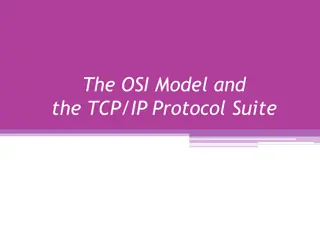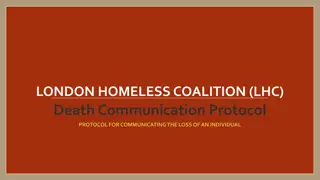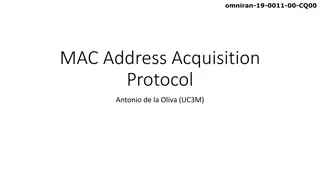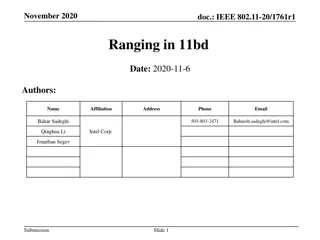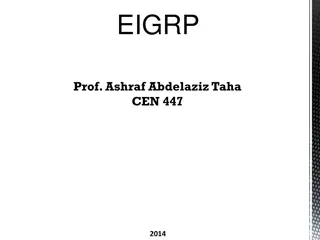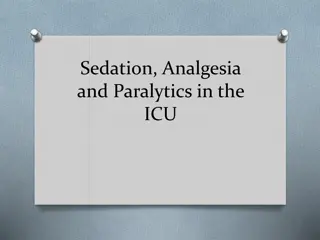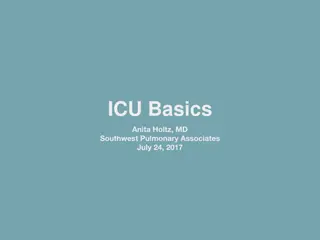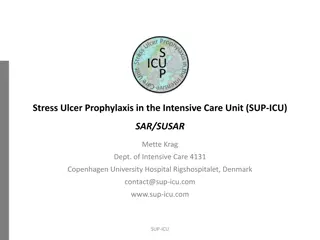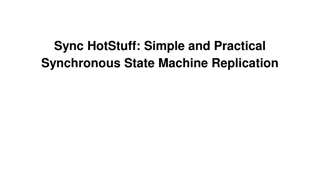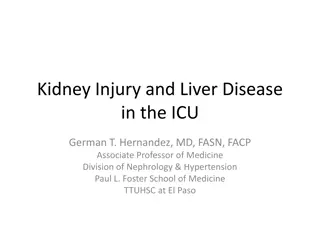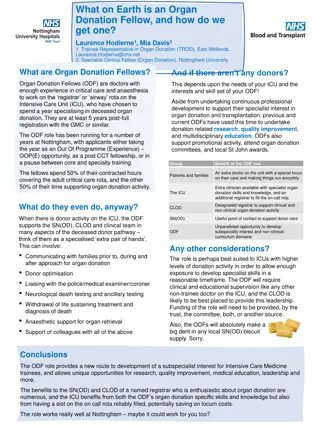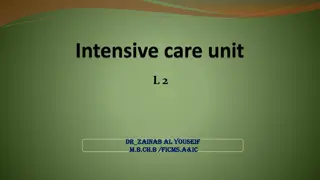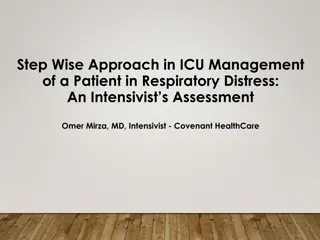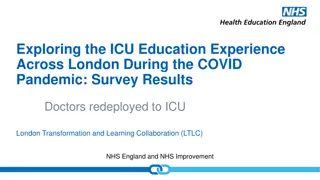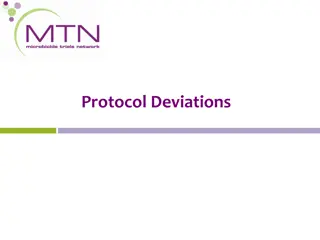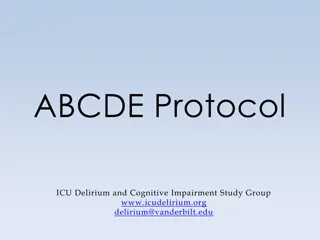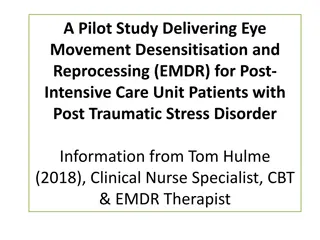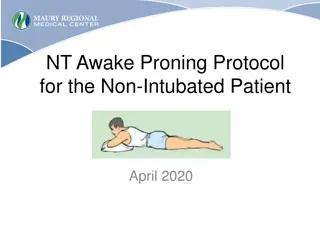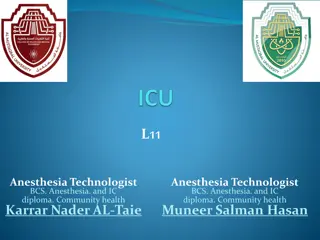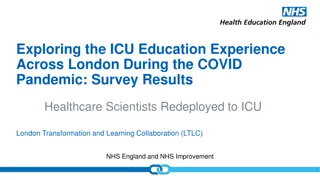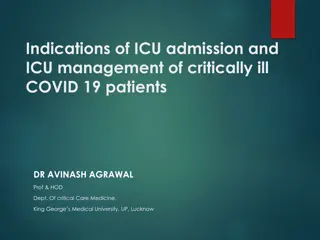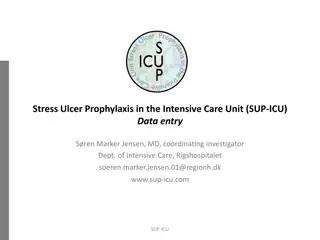Adaptive Tree-based Convergecast Protocol
Adaptive tree-based protocol for managing overlay networks in heterogeneous networks. It proposes improvements to the existing Tree-Based Convergecast Routing (TBCR) protocol by considering additional parameters such as RTT, power consumption, link stability, and link mobility to optimize routing de
32 views • 12 slides
Addressing 5G Signaling Protocol Vulnerabilities
The 8th meeting of the Communications Security, Reliability, and Interoperability Council to discuss and address security vulnerabilities in the newly adopted 5G signaling protocol, HTTP/2. Learn about potential risks, recommended safeguards, and the prevention of these vulnerabilities in the upcomi
3 views • 85 slides
Suicide Prevention & Postvention Protocol
This protocol provides practical advice and support for schools and colleges in Hampshire to navigate the aftermath of a suspected suicide among students or staff members. It includes guidance on interventions, critical incident response, and resources to support the bereaved. Key stages of the post
0 views • 37 slides
Comprehensive ICU Protocol for Sedation, Analgesia, and Delirium Control by Dr. Vinod Srivastava
This comprehensive ICU protocol by Dr. Vinod Srivastava, an Associate Professor in Anaesthesiology & Critical Care at KGMU, covers key aspects such as sedation, analgesia, delirium assessment and control, stress ulcer and deep vein thrombosis prophylaxis, and glycaemic control in the ICU setting. Th
1 views • 50 slides
Guidelines for Intensive Care Unit (ICU) Management by Dr. Zia Arshad
Dr. Zia Arshad provides comprehensive guidelines for managing patients in the ICU, including admission criteria, monitoring protocols, handling lab investigations, communication procedures, and post-mortem care. The guidelines emphasize meticulous documentation, compassionate patient care, infection
0 views • 28 slides
Understanding Antibiotic Therapy in the ICU: Strategies and Considerations
Delve into the world of antibiotic therapy in the intensive care unit (ICU) with a focus on identifying the enemy pathogens, selecting the appropriate antibiotics, and formulating effective treatment plans. Explore the nuances of Gram-positive and Gram-negative bacteria, along with other key bacteri
4 views • 76 slides
Fluid Management in ICU: Understanding Body Fluid Compartments and Types of Fluids
Fluid management in the ICU is crucial for patient care. This includes understanding the distribution of body fluid compartments, such as intravascular, interstitial, and intracellular fluids. Different types of fluids like crystalloids and colloids play essential roles in treatment. Crystalloids ar
3 views • 26 slides
Important Networking Concepts Overview
Review essential networking concepts including protocol architecture, protocol layers, encapsulation, network abstractions, communication architecture, and TCP/IP protocol suite. Understand the functions of different layers in networking for reliable data transfer and communication efficiency.
3 views • 43 slides
Understanding Sleep Patterns and Architecture in the ICU Setting
Sleep in the ICU is crucial for physiological rest and emotional well-being, but it is often disrupted due to various factors. Normal sleep architecture consists of REM and Non-REM sleep cycles, each vital for different restorative processes. Non-REM sleep has three stages, including deep sleep impo
0 views • 25 slides
Understanding OSI Model and TCP/IP Protocol Suite
Explore the concept of layering in data communication, comparing the OSI model and TCP/IP protocol suite. Learn about protocol layers, protocol hierarchies, and the functionality of each layer in these models. Discover the interrelationships between layers and the evolution from OSI to TCP/IP.
5 views • 57 slides
London Homeless Coalition (LHC) Death Communication Protocol
In 2014, the Memorial Committee of the London Homeless Coalition (LHC) established the Death Communication Protocol to acknowledge, share, and address the loss of individuals experiencing homelessness. The protocol aims to inform partnering organizations of confirmed or unconfirmed deaths, support g
0 views • 12 slides
Understanding Mobile Computing and TCP/IP Protocol Suite
Mobile computing is crucial for continuous internet connectivity regardless of physical location. The TCP/IP protocol suite, consisting of Transmission Control Protocol (TCP) and Internet Protocol (IP), forms the backbone of internet infrastructure. IP addressing and mobility challenges are addresse
1 views • 51 slides
Understanding OSI Model and TCP/IP Protocol Suite in Computer Networking
This chapter explores the OSI model and TCP/IP protocol suite, delving into protocol layers, addressing mechanisms, and network components. It highlights the interface between layers, functions of each layer in the OSI model, and compares TCP/IP protocol suite layers with OSI model layers. The discu
0 views • 30 slides
MAAP Protocol Overview in IEEE 1722: Address Acquisition and Message Format
The MAAP (Multicast Address Acquisition Protocol) is defined in IEEE 1722 for time-sensitive applications in bridged local area networks. It involves acquiring multicast addresses through claiming, probing, and defending messages. MAAP enables dynamic allocation of addresses and defending against co
1 views • 8 slides
Understanding Dysphagia in the ICU: Assessment and Impact
Dysphagia, the difficulty in swallowing, is a common issue in the ICU, affecting a significant percentage of intubated patients. It increases mortality, risk of pneumonia, malnutrition, and prolongs hospital stays. Assessment methods like bedside evaluation and FEES are crucial in managing dysphagia
5 views • 8 slides
IEEE 802.11-20/1761r1 Ranging Protocol for 11bd
This document outlines the ranging protocol proposed for IEEE 802.11-20/1761r1, focusing on RTT-based ranging leveraging multi-channel operation. By integrating the 11az ranging protocol, it enables flexible and low-overhead application in 11bd for improved accuracy in ITS bands. The protocol includ
1 views • 13 slides
Understanding EIGRP: A Comprehensive Overview
Enhanced Interior Gateway Routing Protocol (EIGRP) is a dynamic routing protocol providing various advantages to network administrators. It is a classless routing protocol supporting VLSM and is considered an Interior Gateway Protocol (IGP). EIGRP uses advanced distance vector routing and is known f
1 views • 5 slides
Understanding SFTP Server Functionality with ACS 5.x by Mohammad Azharuddin AAA Team
SFTP (SSH File Transfer Protocol) is a secure network protocol for file access, transfer, and management over reliable data streams. It enhances security by extending the SSH protocol and can be implemented using a reliable 8-bit byte stream protocol. SFTP commands are sent as 4 ASCII letters follow
4 views • 23 slides
Enhanced Family Court Police Disclosure Protocol for 2024
The 2024 Family Court Police Disclosure Protocol addresses key issues identified in the 2013 protocol, emphasizing timely and proportionate requests for material. Changes include a new checklist for the judiciary, guidance notes, and revised processes for litigants in person. The protocol provides c
1 views • 19 slides
Sedation, Analgesia, and Paralytics in the ICU: A Comprehensive Guide
This comprehensive guide delves into the use of sedatives, analgesics, and paralytics in the intensive care unit (ICU). It covers various medications like Etomidate, Propofol, Ketamine, Benzodiazepenes, and Dexmedetomidine, detailing their indications, dosages, and effects. Understanding the role of
0 views • 21 slides
Essential Elements of Clinical Trial Protocols
Understanding the key components of a clinical trial research protocol is essential for conducting successful studies. This includes identifying session objectives, discussing trial protocol contents, exploring observational study elements, and learning about reporting guidelines. Study objectives f
1 views • 25 slides
Essential Tips for ICU Rotations
Prepare for your ICU rotation with these essential tips: read the orientation packet, educate yourself with original articles, prioritize patient stability, know your care team, and focus on learning and growth as an intern or resident. Be ready to identify sick patients, understand disease processe
0 views • 33 slides
Stress Ulcer Prophylaxis in ICU - Adverse Reactions Reporting Guidelines
Guidelines for reporting adverse reactions in Stress Ulcer Prophylaxis in the Intensive Care Unit (SUP-ICU), including definitions of Adverse Reactions (AR), Serious Adverse Reactions (SAR), Adverse Events (AE), Serious Adverse Events (SAE), SARs in SUP-ICU, and SUSARs. Specific conditions considere
0 views • 8 slides
Impact of Physiotherapy on ICU Patients: A Comprehensive Study
Investigating the impact of physiotherapy interventions on ICU patients, this study reveals findings on muscle weakness, reduced mobility, chronic pain incidence, and referral patterns post-ICU discharge. The study aims to improve patient outcomes through tailored interventions and follow-ups.
0 views • 11 slides
Sync HotStuff: Practical Synchronous State Machine Replication
Sync HotStuff is a practical synchronous protocol that tolerates Byzantine replicas and handles weaker synchrony models. It overcomes issues of requiring a large number of rounds and lock-step execution. The protocol ensures safety by committing blocks and guarantees liveness by continuing to commit
0 views • 15 slides
Understanding Kidney Injury and Liver Disease in the ICU
This presentation delves into the intricacies of acute kidney injury (AKI) and its occurrence in patients with liver disease in the intensive care unit (ICU). It covers the definitions, classifications, and causes of AKI, emphasizing the Hepatorenal Syndrome, a form of functional renal failure in en
0 views • 29 slides
Understanding the Role of Organ Donation Fellows in Intensive Care Units
Organ Donation Fellows (ODFs) are experienced doctors specializing in deceased organ donation, spending time on the ICU rota and supporting organ donation activities. They assist in donor optimization, communication with families, and organ retrieval, benefiting both ICU patients and the healthcare
0 views • 4 slides
Understanding Common Equipment and Systems in ICU
Common equipment in an ICU includes mechanical ventilators, cardiac monitors, monitoring equipment for bodily functions, and a variety of tubes, lines, and pumps. Drugs like analgesics are used to reduce pain and prevent infections. Monitors track heart rate, blood pressure, and temperature, while t
0 views • 48 slides
Step-Wise Approach in ICU Management of a Patient in Respiratory Distress
An intensivist outlines a systematic approach for managing an acutely unstable patient in respiratory distress in the ICU. The process includes clinical assessment, noninvasive ventilation options, considerations for vital organ functions, and potential pitfalls to avoid. Emphasis is placed on diffe
0 views • 52 slides
Exploring ICU Education Experience in London During COVID Pandemic
Survey results of doctors redeployed to ICU in London reveal the London Transformation & Learning Collaborative (LTLC) program aims to enhance staff preparedness, share best practices, and improve patient outcomes through consistent training and collaboration. The LTLC program focuses on increasing
0 views • 20 slides
Understanding Protocol Deviations in Clinical Trials
Protocol deviations are expected occurrences in clinical trials that may arise from site or participant actions. It is crucial for research teams to identify, report, and learn from these deviations to ensure the integrity and safety of the study. Mechanisms for identifying and reporting deviations,
0 views • 16 slides
Understanding OSI Model and TCP/IP Protocol Suite in Computer Networking
This content delves into the OSI model and TCP/IP protocol suite, highlighting the protocol layers, addressing mechanisms, and communication scenarios. It explores the functions of each layer, the interface between layers, and compares the TCP/IP layers with the OSI model. Through examples and illus
0 views • 46 slides
ABCDE Protocol and MIND-USA: Enhancing Critical Care Practices
Explore the importance of the ABCDE Protocol in managing ICU patients, focusing on sedation, analgesia, and the prevention of delirium. Learn about the potential drawbacks of sedative therapies and the need for coordinated care in critical care settings. Discover the MIND-USA ABCDE Protocol, emphasi
0 views • 43 slides
Delivering EMDR for PTSD in Post-ICU Patients: A Pilot Study by Tom Hulme
More ICU survivors are experiencing PTSD post-discharge. Symptoms include intrusive thoughts, nightmares, avoidant behavior, and hypervigilance. EMDR therapy is recognized as effective. This pilot study aims to provide evidence-based treatment to improve health outcomes in this patient group.
0 views • 10 slides
Seeking a General-Purpose CCSDS Link Layer Protocol: Next-Generation Data Link Protocol (NGDLP)
This document discusses the proposed Universal Frame Format for a next-generation data link protocol, focusing on major questions about transfer frames, Protocol Link Transmission Unit (PLTU), and Universal Transfer Frame Structure. It explores topics such as frame formats, telemetry transfer frames
0 views • 24 slides
NT Awake Proning Protocol for Non-Intubated Patients
This protocol outlines the benefits and procedure for prone positioning in non-intubated patients experiencing mild to moderate hypoxemia. It highlights patient eligibility criteria, equipment required, and considerations for nursing care. The protocol emphasizes improving oxygenation by promoting a
0 views • 11 slides
Nutritional Therapy in the ICU: Enteral and Parenteral Nutrition Overview
Nutrition is crucial in ICU care to provide adequate calories and protein for patients. This involves enteral nutrition via tubes and parenteral nutrition through IV solutions. Enteral feeding should begin within 24-48 hours if the GI tract is functional, while parenteral nutrition includes dextrose
0 views • 13 slides
ICU Education Experience Across London During COVID Pandemic Survey Results
Explore the outcomes of the London Transformation & Learning Collaborative (LTLC) program focusing on enhancing critical care staffing and education in response to the COVID-19 pandemic. The initiative aims to cross-skill staff, expand ICU capacity, and optimize workforce capabilities to manage curr
0 views • 19 slides
Overview of ICU Admission and Management for Critically Ill COVID-19 Patients
There are various strains of coronavirus with Sars-cov-2 causing COVID-19. The virus is transmitted through droplets and has an incubation period of 2-14 days. Clinical features range from mild illness to critical disease with a fatality rate of 2.3-5%. Criteria for ICU admission include the need fo
0 views • 27 slides
Stress Ulcer Prophylaxis in ICU Data Entry System - SUP-ICU Overview
Dive into the Stress Ulcer Prophylaxis in the Intensive Care Unit (SUP-ICU) data entry system led by Dr. Soeren Marker Jensen. Explore screening, randomization, site overview, and data entry processes. Access participant details, edit submitted data, and learn about data entry guidelines. Enter the
0 views • 28 slides




